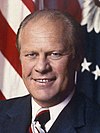Portal:Conservatism/Selected article/5
Gerald Rudolph Ford, Jr. (1913 – 2006) was the 38th President of the United States, serving from 1974 to 1977, and the 40th Vice President of the United States serving from 1973 to 1974. Before ascending to the vice-presidency, Ford served nearly 25 years as Representative from Michigan's 5th congressional district, eight of them as the Republican Minority Leader.
As President, Ford signed the Helsinki Accords, marking a move toward détente in the Cold War. With the conquest of South Vietnam by North Vietnam nine months into his presidency, U.S. involvement in Vietnam essentially ended. Domestically, Ford presided over arguably the worst economy since the Great Depression, with growing inflation and a recession during his tenure. One of his more controversial acts was to grant a presidential pardon to President Richard Nixon for his role in the Watergate scandal. During Ford's incumbency, foreign policy was characterized in procedural terms by the increased role Congress began to play, and by the corresponding curb on the powers of the President. In 1976, Ford narrowly defeated Ronald Reagan for the Republican nomination, but ultimately lost the presidential election to Democrat Jimmy Carter.

